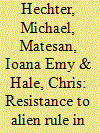| Srl | Item |
| 1 |
ID:
127810


|
|
|
|
|
| Publication |
2014.
|
| Summary/Abstract |
Taking as a starting point the case of Iraq, it is argued that the administration of this country by the Coalition from May 2003 onward, is an American example of a culture-bound type of occupation. Already in the early eighteenth-century international differences in occupation regimes between France, England, and the Dutch Republic are discernable. Therefore, in all likelihood, the United States also developed in the course of their history a characteristic pattern of controlling foreign territories. This American modus occupandi could very well stem from the English style of occupying, but may differ in two important respects: it usually is a "short-winded affair," and it can either come down to a rather peaceful "laissez-faire" or to a war-like type of occupation. Finally, the question is discussed in how far such a style of occupation can result in a more or less "constructive" form of foreign domination. In the author's impression, occupational "success" or "failure" probably depends as much, if not more, on the state of the occupied system-to wit, the degree of unison between native elites-as on the strategy of the occupant.
|
|
|
|
|
|
|
|
|
|
|
|
|
|
|
|
| 2 |
ID:
086738


|
|
|
|
|
| Publication |
2009.
|
| Summary/Abstract |
Although alien rule is widely assumed to be illegitimate, nationalist resistance to it varies across time and space. This article explores why there was greater nationalist resistance to Japanese colonial rule in Korea than Taiwan from the turn of the twentieth century to the end of World War II. Resistance to alien rulers requires both a supply of participants in nationalist collective action and a demand for national self-determination. The article assesses two principal propositions: (1) that the supply of participants increases to the degree that native elites are stripped of their traditional authority and offered few incentives to collaborate; and (2) that the demand for national self-determination decreases to the degree that alien rule is fair and effective. A comparative analysis of the effects of Japanese alien rule in Taiwan and Korea suggests that nationalist resistance is greater in the earliest phases of occupation, that the greater native elites' opportunities, the weaker the resistance to alien rule; and that the fairer the governance, the weaker the resistance to alien rule.
|
|
|
|
|
|
|
|
|
|
|
|
|
|
|
|